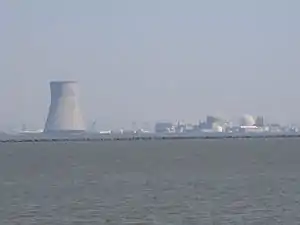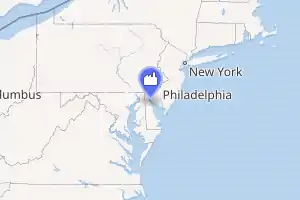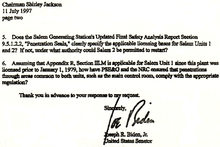Salem Nuclear Power Plant
The Salem Nuclear Power Plant is a two unit pressurized water reactor nuclear power plant located in Lower Alloways Creek Township, in Salem County, New Jersey, in the United States. It is owned by PSEG Nuclear LLC and Exelon Generation LLC.
| Salem Nuclear Power Plant | |
|---|---|
 The entire PSEG nuclear complex as seen from Augustine Beach, Delaware. | |

| |
| Country | United States |
| Location | Lower Alloways Creek, Salem County, New Jersey |
| Coordinates | 39°27′46″N 75°32′8″W |
| Status | Operational |
| Construction began | September 25, 1968 |
| Commission date | Unit 1: June 30, 1977 Unit 2: October 13, 1981 |
| Construction cost | $4.283 billion (2007 USD)[1] |
| Owner(s) | Exelon (43%) PSEG (57%) |
| Operator(s) | PSEG |
| Nuclear power station | |
| Reactor type | PWR |
| Reactor supplier | Westinghouse |
| Cooling source | Delaware River |
| Thermal capacity | 2 × 3459 MWth |
| Power generation | |
| Units operational | 1 × 1169 MW 1 × 1158 MW |
| Make and model | WH 4-loop (DRYAMB) |
| Nameplate capacity | 2327 MW |
| Capacity factor | 88.55% (2017) 70.50% (lifetime) |
| Annual net output | 18,050 GWh (2017) |
| External links | |
| Website | Salem Generating Station |
| Commons | Related media on Commons |
Location
Salem shares an artificial Island in the Delaware Bay with the Hope Creek Nuclear Power Plant.[2]
Reactors
The reactors, both PWRs, were built by Westinghouse, and began commercial operation in 1977 (Unit 1) and 1981 (Unit 2). The two-unit plant has a capacity of 2,275 MWe. Unit 1 is licensed to operate until August 13, 2036 and Unit 2 is licensed to operate until April 18, 2040. In 2009, PSEG applied for 20-year license renewals for both units, which were approved by the NRC in 2011.[3][4]
Surrounding population
The Nuclear Regulatory Commission defines two emergency planning zones around nuclear power plants: a plume exposure pathway zone with a radius of 10 miles (16 km), concerned primarily with exposure to, and inhalation of, airborne radioactive contamination, and an ingestion pathway zone of about 50 miles (80 km), concerned primarily with ingestion of food and liquid contaminated by radioactivity.[5]
The 2010 U.S. population within 10 miles (16 km) of Salem was 52,091, an increase of 54.1 percent in a decade, according to an analysis of U.S. Census data for msnbc.com. The 2010 U.S. population within 50 miles (80 km) was 5,482,329, an increase of 7.6 percent since 2000. Cities within 50 miles include Philadelphia (43 miles to city center).[6]
Safety issues
The New York Times has reported that, in the 1990s, the Salem reactors were shut down for two years because of maintenance problems.[7] Consultants found several difficulties, including a leaky generator, unreliable controls on a reactor, and workers who feared that reporting problems would lead to retaliation. In 2004, the Nuclear Regulatory Commission took on additional oversight of the Salem plants and increased the monitoring of them.[7]
An extensive investigation by the Nuclear Regulatory Commission, and the subsequent review by hired consultants have found many minor problems, such as lack of routine maintenance and low morale among personnel, but declared the plant safe.[8]
On Thursday, August 22, 2013, the Salem Nuclear plant was shut down after a leak of slightly radioactive water. The spill was confined to the plant's containment building, and regulators have said there is no risk to the public.[9] The plant restarted on August 24, after having been shut down for less than 48 hours.[10]
In May 2014 a scheduled refueling outage of Salem 2 was extended after broken bolts from a cooling pump were found in the reactor vessel. Westinghouse dispatched a team to inspect the pumps.[11] The inspection revealed bolts in the bottom of the cooling pumps as well as the bottom of the reactor vessel. Unit 2 was returned to service on July 11, 2014.[12]
Silicone foam combustible firestops


In July 1997, then senator Joseph R. Biden questioned the USNRC concerning Salem's use of silicone foam firestops.
Seismic risk
The Nuclear Regulatory Commission's estimate of the risk each year of an earthquake intense enough to cause core damage to the reactor at Salem was 1 in 90,909, according to an NRC study published in August 2010.[13][14]
Water use

Both reactors use Delaware Bay as a source of cooling water. Salem units 1 and 2 have a water-intake building with a rotating screen to collect debris that is later washed off. Sometimes thick layers of grass clog the intakes and the reactors run at reduced power for weeks as a result.[15][16] All of the waste heat produced in the steam cycle (about 2 gigawatts) is dumped into the bay. The resultant increase in water temperature is regulated to less than 1 °C in summer months, and to 2 °C the rest of the year. The large closed-cycle cooling tower on site is part of the neighboring Hope Creek plant and is not used by the Salem reactors.[17]
Notable employees
Actor Bruce Willis worked at Salem Nuclear Power Plant as a security guard before pursuing acting.[18]
References
- "EIA - State Nuclear Profiles". www.eia.gov. Retrieved 3 October 2017.
- Special to Today's Sunbeam/PSEG Nuclear. "NRC delays review of PSEG Nuclear permit application needed for any new reactor in Salem County". NJ.com. Retrieved 2012-02-08.
- "PSEG seeks licence renewals for two plants". World Nuclear News. August 19, 2009. Retrieved 2009-08-18.
- Gallo, Bill Jr. (June 30, 2011). "Nuclear Regulatory Commission grants 20-year operating license extensions for Salem 1 and 2 reactors in Salem County". Today's Sunbeam. Retrieved 30 June 2011.
- "NRC: Emergency Planning Zones". United States Nuclear Regulatory Commission. Retrieved 2019-12-22.
- Bill Dedman, Nuclear neighbors: Population rises near US reactors, NBC News, April 14, 2011 http://www.nbcnews.com/id/42555888 Accessed May 1, 2011.
- Creating the Nation's Largest Utility Company, New York Times, January 29, 2006.
- Sullivan, John (October 11, 2004). "Problems cited at nuclear plant in South Jersey". New York Times.
- http://abclocal.go.com/wpvi/story?section=news/local&id=9216530 ABC 6 Action News, August 23, 2013
- http://www.nbcphiladelphia.com/news/local/Leak-Leads-to-Shut-Down-of-Nuclear-Plant-220808101.html NBC news, August 24, 2013
- Bill Gallo (19 May 2014). "Broken bolt pieces found in pump, reactor vessel delay Salem 2 nuclear plant restart". South Jersey Times. Retrieved 21 May 2014.
- http://www.nj.com/salem/index.ssf/2014/07/after_trying_time_with_discovery_of_broken_bolts_salem_2_nuclear_returns_to_service.html
- Bill Dedman, "What are the odds? US nuke plants ranked by quake risk," NBC News, March 17, 2011 http://www.nbcnews.com/id/42103936 Accessed April 19, 2011.
- Patrick Hiland, Chairman (September 2, 2010). Memorandum To: Brian W. Sheron, Director Office of Nuclear Regulatory Research (PDF) (Report). Archived from the original (PDF) on May 25, 2017. Retrieved April 19, 2011.
- Wald, Matthew L. (May 1, 1994). "U.S. team finds errors at Salem Nuclear Plant". New York Times. Archives.
- Jeff Montgomery (22 April 2011). "Delaware energy: Grasses force Salem plant shutdown". News Journal. Wilmington, Delaware: Gannett. DelawareOnline. Retrieved 23 April 2011.
- FR Doc E7-20761
- Comment on The Daily Show, June 26, 2007.